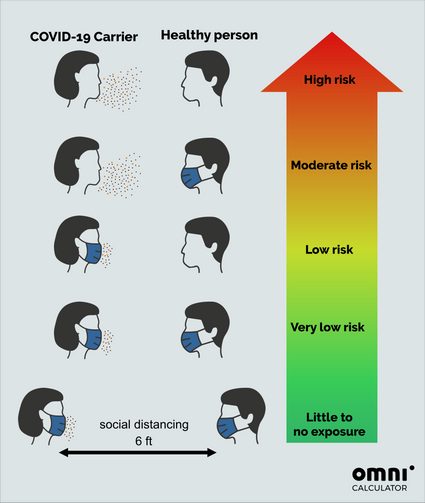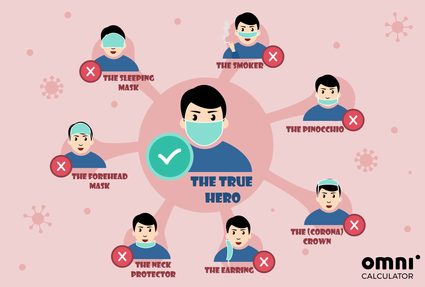Coronavirus Mask Calculator
We're not going to lie - the situation is serious. Experts claim that over with the novel coronavirus, as the CDC estimates that the actual number is 10 times higher than what's reported. The same type of estimation goes for Canada, where their COVID-19 Immunity Task Force started a to show a more detailed picture to show how many cases are actually there, on top of the reported 105 thousand. With a possible second wave looming on the horizon, we need to take action! Luckily, we have tools to mitigate the spread of the virus with surprising efficacy - face coverings!
The benefits of wearing masks in public spaces are unquestionable; many people go through COVID-19 with little to no symptoms, and thus can unknowingly spread it even by the simple act of talking. That's why wearing a mask in public is so important! Recent studies report that , though some mention numbers even higher than that. Depending on the type of mask, they can stop up to 99% of viral matter (N99 filters). Even a regular, homemade cloth mask (which is ) is enough to significantly reduce the risk of spreading the infection. A recent model shows that !
We have prepared this calculator in hopes that it will help you make an informed decision about the kind of mask that you need to protect yourself and others. With its assistance, you can estimate how many masks or filters you will need for a given period of time, and how much money they will cost you. Read on if you're interested in the scientific background of the importance of face masks in this difficult time, and check if you've been wearing your mask correctly!
Why is wearing a mask important?
The main problem with the novel coronavirus is its high infection rate - we have reasons to believe that . With no precautions undertaken, the virus would spread exponentially, eventually overwhelm healthcare systems, and lead to a grim situation where hospitals simply cannot house any more people in need of medical help. Luckily, we now know that there are a number of things we can do to effectively slow this process enough to let medics treat everyone and even, in the long run, allow scientists to find a way to beat COVID-19. These include:
- washing your hands thoroughly with soap;
- frequently using hand sanitizer;
- practicing social distancing;
- avoiding public gatherings in crowded spaces, for example, by stockpiling food every once in a while instead of frequent grocery shopping; and
- Last, but not least, wearing masks in public spaces.
In light of more and more research on the benefits of wearing masks during the COVID-19 pandemic, , strongly recommending wearing masks in public spaces, especially when maintaining a distance is difficult or impossible. It's important to note that, provided that you don't suffer from a preexisting respiratory system condition, you should wear a mask in public even if you're feeling fine. Research conducted so far suggests that a vast number of people infected with the novel coronavirus do not experience any symptoms, and could unknowingly spread the disease further.
Luckily, studies show that masks allow for a decrease in the spread of the virus, with a surprisingly high effectiveness. Even a regular, . In the case of N95 and N99 masks with filters, the efficacy can reach even 99.98% of viral matter. A recently published paper provides strong evidence that , making the spread of COVID-19 manageable. Combined with the other protective measures, such as increased hygiene and distancing, it may be just enough to get the pandemic under control!
In essence, the message to take away here is this: a mask protects both you and the people around you. While it may be impossible to pinpoint exact percentages, this infographic provides a quite accurate perspective on the benefits of wearing a mask during the COVID pandemic.

Want to explore the probability of controlling the COVID-19 outbreak? Use the social distancing calculator.
How does the mask calculator work?
For most of us, face masks are a novelty, and we don't usually take them into account in our budgets. What's more, with all the new kinds available, working out which mask is the best for you and how long it can last might get confusing. Our coronavirus mask calculator is designed to make your life a little easier by estimating the costs of face masks, as well as telling you how many masks (or filters, depending on the kind) you need to get to meet your needs.
The calculator takes the data about the kind of mask you're using and combines it with the information you provide to tell you several things. While using it, you will learn:
- How effective the mask you're using is at protecting you. You can click through the different types and compare their efficacy in order to make the best possible choice regarding your safety;
- How many masks or filters you will need for a given period of time. While getting your hands on a mask is no longer the struggle it was at the start of the pandemic, it's still important to plan ahead;
- How often you need to change your mask (or its filter). It's important to remember that masks don't work indefinitely! To stay protected, you need to make sure your mask is fresh and maintained properly; and
- How much will the masks and filters cost you. With this information, you can set up a mask budget to last you for as long as you need!
The results vary depending on the type of mask you choose. Our calculator allows you to choose from the most common kinds:
- CLOTH MASKS

Cloth masks are typically cheap, widely accessible, and . As far as we know, they present in exhaled air, although their might be higher. The main reason is that they effectively stop fluids from coughs and sneezes. One of the biggest pros of this kind of mask is that they're reusable. Provided that you wash your masks regularly, as little as five of them can suffice on a daily basis. The CDC recommends cloth masks as the best choice for everyday purposes.
- SURGICAL MASKS

Surgical masks, similarly to cloth mask, . They again do, however, block droplets (from sneezing or coughing), which is also an effective way to decrease the risk of infecting someone. They require frequent changing, and as they're not reusable, they are the least eco friendly option. Still, a surgical mask is better than no mask.
If you use surgical masks, make sure to put a new one on every two hours.
- N95/N99 RESPIRATORS

N95/N99 respirator masks block up to 99% of viral matter! If you're using N95/N99 masks with no changeable filter, make sure to change them after every 16 hours of use.
- MASKS WITH N95 FILTER

N95 mask filters can block up to 95% of viral matter. Remember to exchange the filter once a week.
- OTHER FFRs (including N99)

Masks with other FFRs (Filtering Facepiece Respirators) can block up to 99% of viral matter! It depends on the filter type and how often you need to change it, but once a week is a good rule of thumb.
How to wear a mask safely?
Wearing a mask is easy enough, but it's important to keep in mind the way you wear it determines how well it will work. Most importantly, remember that a mask should always cover both your mouth and your nose. A common mistake is wearing a mask over only your mouth, only your nose, or even just your chin. In all these cases, it essentially defeats the purpose of putting the mask on in the first place, as it allows potential viral matter to go through undisturbed!

When putting your mask on and taking it off, it's important to follow some simple rules.
PUTTING YOUR MASK ON SAFELY:
- Clean your hands thoroughly with soap and water, or an alcohol-based hand sanitizer, before you touch the mask you're about to put on.
- In the case of a surgical mask, figure out its top and its front. The side with a stiff bendable edge is the top, and the colored side is usually the front, while the white side should touch your face.
- If your mask has:
- Earloops: hold it by the loops. Place a loop behind each ear.
- Ties: bring the mask to your nose level, place the ties over your head and tie them into a bow.
- Mold or pinch the edge of the mask to fit your nose. The more fitting it is, the better the effect. If you wear glasses, they should not fog over if the mask is fitted correctly.
- Pull the bottom of the mask over your mouth and chin.
REMOVING YOUR MASK SAFELY:
- Clean your hands thoroughly with soap and water, or hand sanitizer, before starting. Avoid touching the front of the mask, as it could be contaminated!
- Hold the ear loops or untie the ties and gently lift them to remove the mask.
- If you're using a disposable mask, throw it in the trash carefully. If your mask is reusable, wash it as soon as possible. Clean your hands thoroughly again once you're done with the process!
If you'd rather see how it's done, we encourage you to check out this helpful instructional video provided by the World Health Organization.
🔎 Want to learn more about COVID-19-related topics? Visit the quarantine food calculator and the hand sanitizer calculator to find out how to shop wisely during the time of the pandemic and how much hand sanitizer you need.
Are masks controversial?
It's hard to argue that the new normal isn't inconvenient. It's true that masks are not the most comfortable thing to wear, especially in the warm summer months. Unfortunately, some people go as far as considering wearing masks a limitation on their personal freedom. Anti-mask movements have appeared in the United States, and even some , making this a political issue. But are masks really that controversial?
Face masks work. . According to scientists, countries in which face coverings were used widely during the early stages of the pandemic are more likely to not only have significantly lower death rates, but also to have shorter outbreaks than in areas with no mask-related policies. A study focused on the same thing in the USA's context found that the , and estimates that face coverings most likely prevented as many as 450,000 cases of COVID-19 by May 22, 2020.
These numbers speak for themselves. Even though wearing a mask might be inconvenient, it's one of our strongest lines of defense in the fight against COVID-19. Wearing a mask does not take away your personal freedoms - it ensures your right to stay healthy, and shows that you care for the well-being of yourself and others!